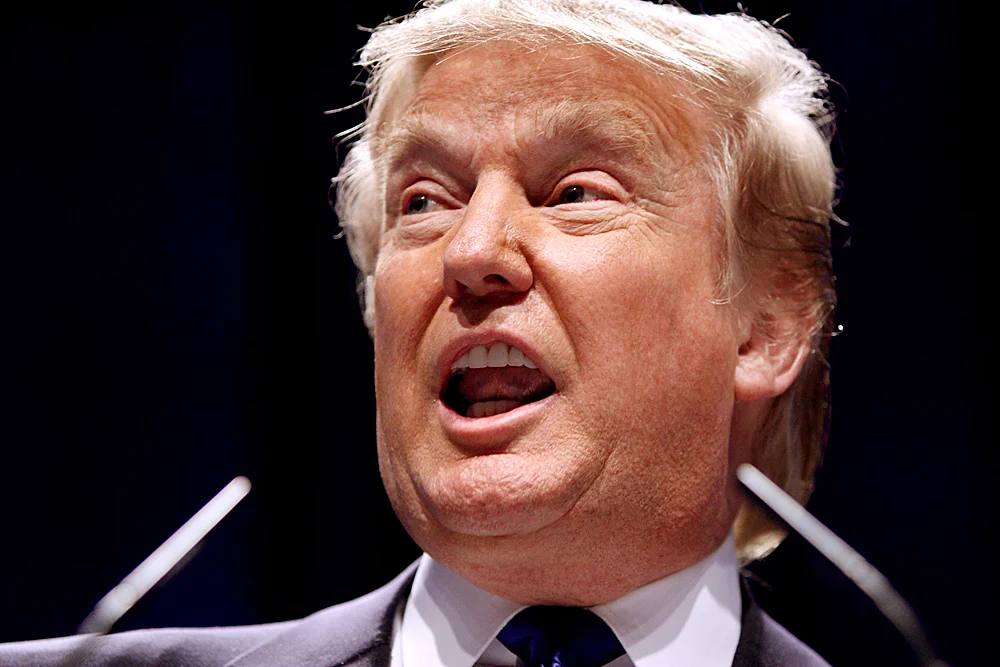Trump Vows to Impose New Tariffs on Mexico, Canada, and China: A Bold Move with Potential Economic Fallout
In a move that could dramatically reshape U.S. trade relations, President-elect Donald Trump has announced plans to impose new tariffs on Mexico, Canada, and China starting on day one of his presidency. This bold move, aimed at addressing illegal immigration and drug smuggling, signals an escalation in U.S. foreign policy that could lead to significant economic consequences. While Trump’s tariffs have long been a hallmark of his economic agenda, these new measures could not only affect the countries involved but also reverberate throughout the global supply chain and impact U.S. consumers.
A Day-One Tariff Strategy: What’s at Stake?
When Donald Trump assumes office on January 20, 2025, he plans to sign an executive order imposing a 25% tariff on all goods imported from Mexico and Canada. This is a significant move, as these two countries are the U.S.'s top trading partners. The tariffs, according to Trump, are designed to pressure Mexico and Canada into taking stronger actions to stem the flow of illegal immigration and drug trafficking into the United States.
In addition to the Mexico-Canada tariffs, Trump intends to impose a 10% additional tariff on all imports from China until Beijing takes more substantial steps to curb the flow of fentanyl and other illicit drugs into the U.S. The issue of drug smuggling, particularly the opioid crisis exacerbated by fentanyl, has been a cornerstone of Trump’s rhetoric for years, and he appears determined to make it a central issue in his trade policies.
This announcement comes on the heels of the president-elect’s statements during his campaign, where he vowed to crack down on illegal immigration and drug trafficking using tariffs as a key tool in his foreign policy arsenal. While these tariffs are set to be applied immediately after his inauguration, the specifics of how they will be implemented and enforced remain unclear.
Economic Impact: How Will Tariffs Affect U.S. Consumers and Businesses?
The U.S. is the world’s largest importer, and the economic impact of these tariffs will be far-reaching. Together, Mexico, Canada, and China account for roughly 40% of the $3.2 trillion worth of goods the U.S. imports annually. The tariffs proposed by Trump would significantly increase costs on products ranging from automobiles to electronics, agricultural goods, and consumer items.
Tariffs, by nature, are taxes on imports that are passed on to consumers in the form of higher prices. For example, a car worth $50,000 imported to the U.S. would face a $12,500 charge if subjected to a 25% tariff. Such price increases could affect millions of American consumers, especially in industries reliant on imported goods, like electronics and automobiles.
The tariffs would be particularly damaging to industries that depend heavily on trade with these three countries. The U.S. automotive industry, which relies on the free flow of parts and vehicles between the U.S., Mexico, and Canada, would likely see production costs rise. For example, major automakers like Ford, General Motors, and Chrysler, which have manufacturing plants across North America, could face higher costs in production as a result of these new tariffs. If manufacturers raise prices to compensate for increased production costs, consumers could be faced with higher vehicle prices.
Additionally, U.S. farmers could be significantly impacted. Mexico is the U.S.'s largest export market for agricultural products, and tariffs could create barriers to trade in this sector. Higher tariffs would increase the costs of goods like produce, meat, and dairy products, potentially leading to higher grocery prices for U.S. consumers. Furthermore, retaliation from Mexico, Canada, and China could also affect American exports, especially in the agricultural sector.
The global supply chain could face disruptions as companies scramble to adjust to the new tariff structure. U.S. companies that rely on Chinese imports for raw materials, components, or finished goods might face delays or shortages. With China being the world’s largest exporter, a tariff of this scale would likely result in price hikes on products ranging from electronics to clothing.
Diplomatic Tensions: The Political and International Fallout
The tariffs, which target the U.S.'s three largest trading partners, have already sparked diplomatic tensions. Both Canada and Mexico have expressed concern about Trump’s tariff threats, citing the potential for disruptions in trade and the global economy. Canada’s Prime Minister Justin Trudeau had a brief discussion with Trump about the tariffs, pointing out that the flow of illegal migrants into Canada is much lower compared to the U.S.-Mexico border. Trudeau’s stance indicates a clear resistance to the proposed tariffs and a desire for diplomatic resolution, rather than economic coercion.
In response to Trump’s tariff announcement, Mexico’s finance ministry issued a statement stressing the importance of the U.S.-Mexico trade relationship, stating that Mexico is the U.S.'s top trade partner and that the USMCA (United States-Mexico-Canada Agreement) provides a framework for national and international investors. The finance ministry also emphasized that the U.S. should not place the blame for illegal immigration and drug trafficking on Mexico. The Mexican government has suggested that the U.S. should address its own issues with illegal drug consumption and gun smuggling before targeting Mexico with tariffs.
While the U.S. and Mexico share a complicated relationship when it comes to immigration and trade, the proposed tariffs have the potential to undermine the strong economic ties that have been built through NAFTA and its successor agreement, the USMCA. Both countries rely heavily on each other for goods and services, and disruption to this relationship could result in economic damage for both sides.
As for China, Trump’s additional 10% tariff would exacerbate tensions between the two countries, which have been in the midst of a trade dispute for years. China has already pushed back, accusing the U.S. of misrepresenting its efforts to curb fentanyl trafficking. China has also warned that a trade war with the U.S. would have no winners, signaling its intent to retaliate against any new tariffs with measures of its own.
Related: What Is A Tariff?
Retaliation and Escalation: Will a Trade War Erupt?
If Trump moves forward with his tariff plans, the potential for retaliation from Mexico, Canada, and China is high. These countries could impose their own tariffs on U.S. goods, which would hit American industries hard. A major concern is the agricultural sector, as both China and Mexico are key buyers of U.S. agricultural exports, including soybeans, corn, and meat. In the event of retaliatory tariffs, U.S. farmers could see their export markets shrink, resulting in lower profits and potential job losses in rural areas.
Mexico and Canada might also target American manufacturers and automotive exports, which could lead to further price hikes on U.S. goods. With an interconnected global economy, any major trade disruptions could send shockwaves through global supply chains, affecting industries that rely on cross-border trade and manufacturing.
Trump’s tariffs could also violate the terms of the USMCA, which was signed into law in 2020 under his previous administration. This trade agreement aimed to preserve tariff-free access for North American goods and services. By imposing tariffs on Mexico and Canada, Trump would effectively be undermining the agreement, straining relations and creating uncertainty for businesses that rely on free trade across borders.
Related: Steve Madden Takes a Bold Step, Cutting Ties with China in Response to Trump’s Proposed Tariffs
Related: Trump’s Tariff Threat: UK Could Face £22 Billion Loss as Global Trade Disruption Looms
Trump’s Strategy: Economic Leverage or Miscalculation?
Trump’s strategy of using tariffs as a tool of diplomacy is not new. During his first term as president, he imposed tariffs on a range of goods, from steel and aluminum to technology products, in an effort to force foreign countries to bend to U.S. trade demands. His administration’s "America First" agenda relied heavily on using tariffs as a means to protect U.S. industries and create leverage in negotiations.
The new tariffs, however, come at a time when the global economy is facing significant challenges, including rising inflation, supply chain disruptions, and political instability. In this context, the potential for a trade war is even more dangerous. Some experts argue that Trump’s move is a high-risk strategy designed to force China, Mexico, and Canada to meet his demands. However, others view it as a potential miscalculation that could harm U.S. consumers and businesses, particularly those that rely on imported goods and global supply chains.
As Trump’s pick for Treasury Secretary, Scott Bessent, has suggested, the president-elect’s rhetoric around tariffs could be part of a broader negotiation strategy, using the threat of higher tariffs to pressure foreign governments into making concessions. Bessent described Trump’s tactics as “escalate to de-escalate,” meaning that he may use tariffs as a bargaining chip to negotiate more favorable terms.
A Dangerous Gamble for the Global Economy
Trump’s vow to impose new tariffs on Mexico, Canada, and China represents a significant shift in U.S. foreign policy. While these tariffs may be part of his broader strategy to address issues like drug smuggling and immigration, they also carry substantial risks. The economic fallout could be severe, with rising prices for U.S. consumers, disruptions to global supply chains, and retaliatory measures from the affected countries.
As the world watches closely, Trump’s approach to tariffs could mark a new era in U.S. trade policy—one that could reshape global trade relationships and have long-lasting effects on the world economy. The question remains whether these bold moves will deliver the desired results or whether they will lead to an all-out trade war with significant repercussions for all involved. Only time will tell.
Imposing tariffs on Mexico, Canada, and China will inevitably raise the prices of goods for American consumers. While the intent is to address illegal immigration and drug smuggling, the broader economic impact could be severe. Tariffs function as taxes on imports, and businesses will likely pass these increased costs onto consumers. Everyday items such as electronics, automobiles, and household goods could become more expensive, disproportionately affecting middle and lower-income households. The trade war could also disrupt global supply chains, lead to job losses, and provoke retaliatory tariffs, further harming the U.S. economy rather than solving the underlying issues.









